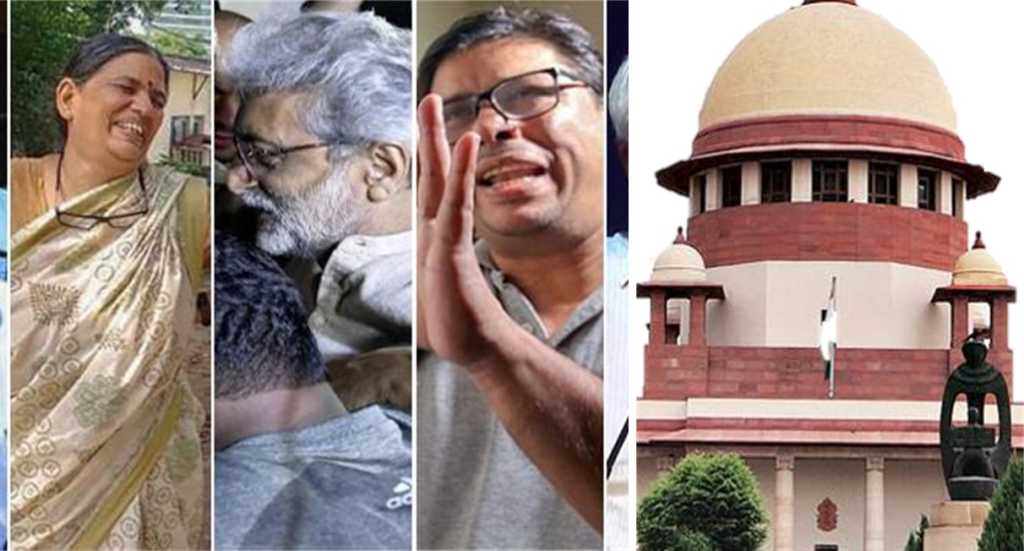In what can be termed as major setback to the cabal, the Supreme Court rejected the plea for investigation by Special Investigation Team (SIT) into the Bhima Koregaon case. The Supreme Court maintained that the accused persons do not have a say in which investigation agency should probe the case. The majority opinion by Justice A M Khanwilkar and CJI Dipak Misra rejected the plea. However Justice D Y Chandrachud disagreed with the majority opinion and dissented.
#BhimaKoregaon: Accused persons do not have say in which investgating agency should probe the case, Supreme Court.
— Bar and Bench (@barandbench) September 28, 2018
The judgment authored by Justice A M Khanwilkar for himself and CJI Dipak Misra stated that it was not a case of arrest merely because of dissent or difference in political opinions.
#BhimaKoregaon: This is not a case of arrest merely because of dissent or difference in political views, Supreme Court.
— Bar and Bench (@barandbench) September 28, 2018
The Supreme Court passed the interim order allowing the house arrest to continue for four more weeks. The five alleged Urban Naxals -Varavara Rao, Arun Ferreira, Vernon Gonsalves, Sudha Bharadwaj and Gautam Navlakha- are under house arrest at their respective homes since August 29.
#BhimaKoregaon: Supreme Court declines to constitute SIT, accused at liberty to pursue other appropriate remedies.
The interim order passed by court for house arrest shall continue for four more weeks, Supreme Court.
— Bar and Bench (@barandbench) September 28, 2018
Once again on #BhimaKoregaon SC #TakeTheRightStand Big Victory for Maha Govt and @Dev_Fadnavis . Maha Police asked to continue investigation. House arrest extended for 4 weeks. SIT demand rejected… @CNNnews18
— Anand Narasimhan🇮🇳 (@AnchorAnandN) September 28, 2018
All the five alleged Urban Naxals have been arrested under the Unlawful Activities Prevention Act (UAPA). They all have been arrested on the basis of evidence collected by the Pune Police following the arrest of 10 suspected members of the banned CPI (Maoist) in the Bhima-Koregaon violence case. The accused and their sympathizers claim that the arrest was an attempt to silence the voice of dissent. The cabal claimed that the five arrested alleged Urban Naxals are political prisoners. However, in its recent judgment the Supreme Court has completely rubbished the dissent argument.
The Maharashtra Police has also defended the arrest of five alleged Urban Naxals. At a press conference, Maharashtra Police ADG (Law and Order) Parambir Singh said that Pune Police launched a nationwide crackdown against the Urban Naxals only after gathering strong evidences against them, proving their links with banned Maoist groups. He also added, “Investigation revealed that a big controversy was being plotted by Maoist organisations. The accused were helping them to take their goals forward. A terrorist organisation was also involved.”
For more details: Pune Police confirms concrete evidence linking arrested Urban Naxals to Maoists
The Supreme Court also found no fault in investigation of Maharashtra Police against the five arrested alleged Urban Naxals. It also gave green signal to Maharashtra Police to continue with their investigation against the accused.
One thing Supreme Court has made very clear that the arrest has nothing to do with the dissent with the incumbent leadership at the centre. So, now the evidences would decide the fate of the case and as far as evidences are concerned then Pune police claims that it have solid evidences against the five-alleged Urban Naxals. In the earlier hearing, Additional solicitor general Tushar Mehta had referred to a document recovered from the computers of one of the activists which according to him termed the government forces as the “enemy” and talked about shattering the morale of the security forces by attacking them through ambush. The recipients of the letter had been asked to provide logistical support to the Maoist cadres which were supposed to carry out the planned attacks. After reading out the letter Mehta said, “Please take note how the author of the letter is telling about cadre not being able to move freely because of checking by security forces and seeks guidance from the recipient on conducting bigger attacks. Please note the six places they are talking about carrying out ambush on security forces, and actually four ambushes took place.”
Citing another 100 page document prepared by the CPI Maoist eastern region bureau, Mehta said that the document spoke about implementing propaganda where its killed cadres would be branded as innocent tribals. The document also congratulates and boasts of an attack on the security forces wherein 25 ‘enemy’ forces lost their lives. Mehta said, “The arrests have nothing to do with dissent. Anyone can dissent against government policies, write articles and protest. But terming government forces as enemy is surely no dissent. Planning to ambush government forces can never be called dissent.”
